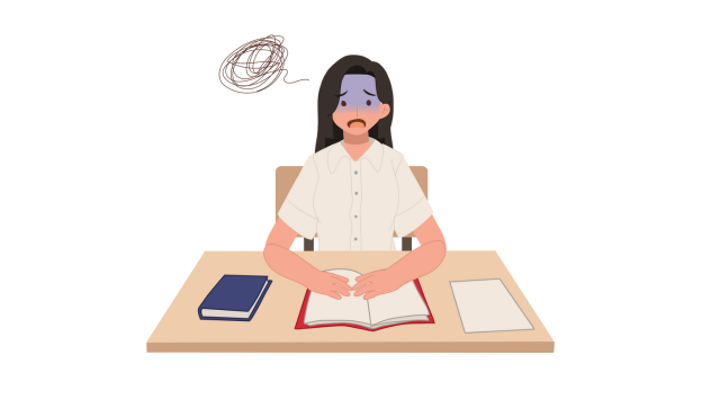How to conquer academic anxiety through mindfulness
Anxiety is a stress response, causing feelings of fear, dread, or uneasiness. Symptoms of anxiety often show up as restlessness, excessive worry, and in some cases, an elevated heart rate. Results from the American College Health Association Fall 2018 National College Health Assessment found that anxiety among college students is rising, with over 60% of students reporting overwhelming anxiety throughout their school year. Students who are transitioning to college face a sharp increase in anxiety due to the pressure of academics, social changes, and new responsibilities.
Roots of academic stress. According to a 2023 article by the World Journal of Clinical Cases, college students experience anxiety due to a combination of internal and external pressures, including factors such as:
Simple steps can ease the pressure. Here are effective solutions to try:
Time management: Break assignments into smaller tasks and use planners or apps to stay on track. Check out Time Blocking to help unlock more free time.
Positive self-talk: Harness the power of your mind over matter by replacing negative thoughts with affirmations, such as “I’ve prepared the best I can,” or “I am capable of overcoming challenges and whatever comes next.”
Healthy lifestyle: Maintaining proper sleep, nutrition, and regular exercise all support mental health.
Seek support: Talk to campus counselors, professors, or mental health professionals when you need help.
Let’s practice a solution: Labeling your feelings for anxiety relief
Pause your activity. Sit still and take a deep inhale through your nose and slowly exhale through your mouth.
Turn your attention inward. Ask yourself: What am I feeling right now emotionally?
Name the emotion. Use simple words: “I feel nervous,” “I feel frustrated,” “I feel overwhelmed.” Avoid judgment by knowing that your emotions are valid.
Say it silently or out loud. Repeat it gently to yourself: “This is anxiety.” Naming it will help separate yourself from the emotion.
Remind yourself it’s temporary. Say: “It’s okay to feel this. It will pass.” This allows you to embrace yourself with self-compassion.
Repeat this exercise anytime you feel anxiety creeping in. It only takes a few minutes and helps calm your mind.
Start the semester with self-trust. Academic anxiety is real, but it doesn’t have to control your college experience. By recognizing what causes your anxiety and practicing mindfulness, time management, and labeling your feelings, you can take proactive steps to manage it.
As a new semester begins, visualize your academic journey by considering the challenges you may face, how you’ll navigate and overcome them, and the ways you will celebrate the wins (big or small) along the way. With awareness and practice, you can create a semester that will feel more grounded, focused, and fulfilling.
References
American College Health Association. (2018). American College Health Association-National College Health Assessment II: Reference Group Executive Summary Fall 2018. https://www.acha.org/wp-content/uploads/2024/07/NCHA-II_Fall_2018_Reference_Group_Executive_Summary.pdf.
Liu X.Q., Guo Y.X., & Xu Y. (2023). Risk factors and digital interventions for anxiety disorders in college students: Stakeholder perspectives. World J Clin Cases 2023; 11(7): 1442-1457. https://doi.org/10.12998/wjcc.v11.i7.1442.
Naja Fonseca is a psychology student at Loyola Marymount University with a passion for mental health advocacy. She authored this post during her internship with ZenEdge Coaching through the Youth Mental Health Academy, a career development program that supports students interested in mental health and other health-related careers. The Youth Mental Health Academy is an initiative of the Child Mind Institute, the nation’s leading independent nonprofit dedicated to children’s mental health. Naja hopes to use her knowledge and experiences to help make mental health resources more accessible and empowering for all.


